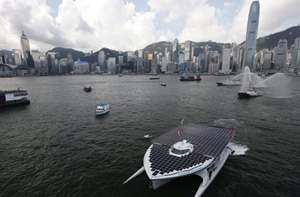SAFE to keep up pressure on 'hot money'
Updated: 2011-08-18 09:33
By Wei Tian (China Daily)
|
|||||||||||
BEIJING - The State Administration of Foreign Exchange (SAFE) pledged to keep up the pressure against "hot money", as it seeks to deal with speculative capital inflows amid rising inflation and ample global liquidity.
In a statement posted on its website on Wednesday, the regulator said it had dealt with 1,865 cases in violation of the foreign exchange regulations in the first half of 2011, involving a total of $16 billion, 26 percent more than the same period last year.
SAFE has joined hands with law enforcement authorities and uncovered 10 cross-border cases, such as illegal private banks and online arbitrage transactions, with more than 10 billion yuan ($1.6 billion) involved.
"Facing a complicated economic situation at home and abroad, SAFE will continue fighting illegal cross-border capital flows and maintain high pressure on the inflow of hot money," the statement said.
SAFE's statement came as the exchange rate of the yuan against the dollar rose to a 17-year high this week and the US Federal Reserve Board announced it would hold interest rates at record lows in the long term.
China's foreign exchange reserves increased by $274.9 billion in the first half to a record $3.2 trillion as of the end of June.
Liu Mingkang, head of the country's top banking regulator, said on Wednesday that the pressure of imported inflation was persisting because of excessive liquidity globally.
"The slowdown of global economic growth, which leads to decreasing overseas market demand, is posing challenges to China," Liu was quoted by the People's Daily as saying.
Monetary easing in major developed economies is bringing stronger flows of short-term capital into emerging economies, further pushing up domestic inflation, he added.
"Emerging economies boast higher growth rates and interest rates and larger room for currency appreciation. Thus, they could easily become the destination of hot money," said Zhang Ming, a researcher with the Institute of World Economics and Politics at the Chinese Academy of Social Sciences.
The consumer price index, a main gauge of inflation, reached 6.5 percent in July, the highest level in the past 37 months, causing the central bank to reiterate that price controls will remain its priority in the second half.
World Bank President Robert Zoellick said in Sydney on Sunday that China might let its currency appreciate to curb rising price pressures, which suggests the world's second-largest economy will attract more global speculative capital.
"What's more dangerous than actual appreciation is the expectation of appreciation," said Guo Tianyong, director of the Research Center of the Chinese Banking Industry at the Central University of Finance and Economics.
"But once the yuan actually appreciates, the pressure will be eased."
Guo said that with expectations for a third round of quantitative easing by the United States and an expected weak dollar in the long term, China must be vigilant, watching every possible direction and form of "hot money" inflows.
"While plugging loopholes, we should also find ways to guide some inbound capital to be used properly; we can encourage such capital to flow into small and medium-sized enterprises," Guo said, adding that the mainland's latest policy to allow the inflow of capital from Hong Kong is advisable.













